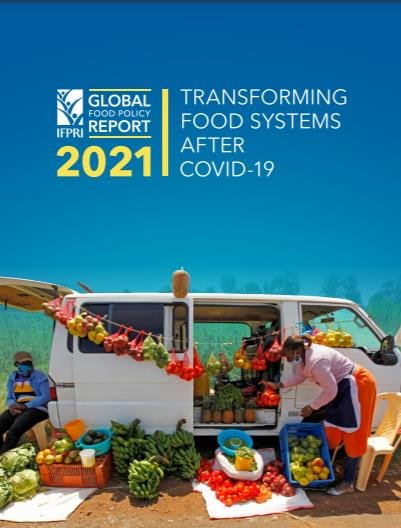- Share this article
- Subscribe to our newsletter
2021 Global Food Policy Report
The 2021 Global Food Policy Report entitled Transforming Food Systems After COVID-19, released by the International Food Policy Research Institute (IFPRI) in April 2021, provides lessons drawn from the COVID-19 pandemic that can help us transform food systems to reduce the impact of the ongoing pandemic, better prepare for future shocks, and address longstanding weaknesses and inequalities.
The report draws on evidence from low- and middle-income countries (LMICs) across the globe to analyse both the impacts of and the policy responses to the crisis, with a particular focus on vulnerable groups, who have suffered disproportionately. The report details how livelihoods, food security, and nutrition have been affected; how and why impacts have varied across regions and countries; and what our food systems and food supply chains need to look like to better absorb such shocks in the coming years.
Key lessons from the pandemic about food systems
The report also highlights key lessons from the pandemic about food systems. In general, demand-side effects, due to job losses and falling incomes, had a stronger impact on food security than supply disruptions. Food value chains, despite many disruptions, proved to be fairly resilient, albeit with variations across commodities and regions; and policies declaring agrifood workers and services as essential helped to cushion disruptions. Research findings show that those food systems transitioning from traditional to modern, and characterised by longer but often fragmented supply chains, proved to be most vulnerable.
Many countries invested heavily in social protection measures to help stem rising poverty and food insecurity, increasing benefits or expanding them to new recipients. Programs built on robust existing systems were the most successful; whereas the scale of growth in programs across the globe has shown that widespread political will can rapidly grow such pro-poor programming.
Increasing resilience for food, health and economic systems
Learning from what has and has not worked can play a major role in curtailing the impacts of the ongoing pandemic and meeting the 2030 Sustainable Development Agenda. Major shocks like COVID-19 that disrupt food, health and economic systems are likely to increase due to climate change and global interconnectivity, making transforming these systems imperative. The report suggests three avenues for increased resilience: limiting the frequency and magnitude of shocks; investing in early warning systems to anticipate shocks; and building capacity to adapt to and absorb shocks when they happen.
The report notes the important role of private sector innovation in times of crisis, which requires an enabling policy environment, as well as physical and digital infrastructure. Better digital infrastructure is imperative not only for a business environment that fosters innovation, but also to bridge the “digital divide” that leaves the world’s most vulnerable underserved and more exposed to the impacts of crises.
(IFPRI/ile)
Visit the website of the 2021 Global Food Policy Report – Transforming Food Systems After COVID-19





Add a comment
Be the First to Comment